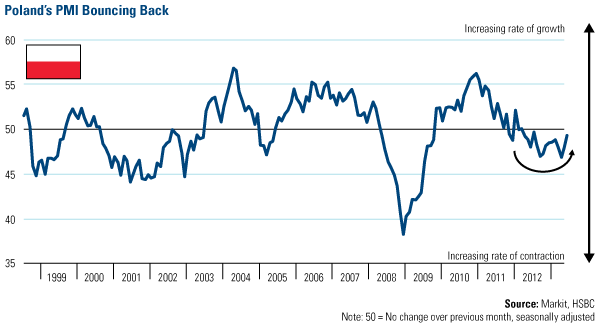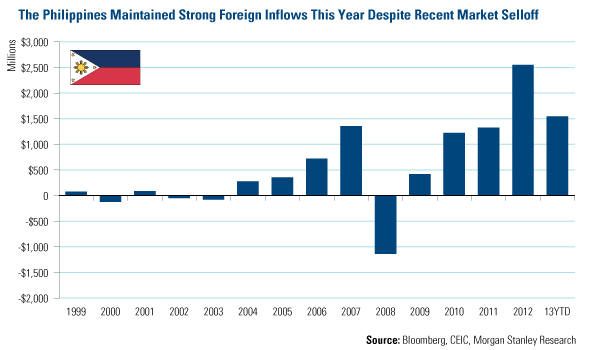Emerging Markets Radar (July 8, 2013)
Strengths
- Poland's purchasing managers' index (PMI) rose to 49.3 in June, up from 48.0 in May. This is the second-highest result in the current cycle of 15 readings below the 50 mark. The bigger picture is that growth in manufacturing is still bordering on contraction, but June’s PMI reading suggests it might swing into growth in the third quarter. As seen in the chart above, HSBC believes the economy has bottomed in the first half of 2013 and a gradual, though slow, recovery will follow. In addition, Poland’s central bank cut borrowing costs to a record low, cutting by 2.25 percentage points since November. The central bank indicated that the cycle of interest rate reductions was over, and the European Union’s largest eastern economy is poised to recover.
- Mexico has approved a 10 billion peso ($772 million) credit program for the nation’s homebuilders as Homex, Urbi and Geo, the three biggest players, seek to restructure their debt after a shift in government policy depleted their cash. Despite the modest size of the financing program, which equals to just 18 percent of the 55 billion pesos of debt owed by the three biggest homebuilders, the program’s approval is a sign that President Enrique Pena Nieto enjoys sufficient parliamentary support to have his “Mexico Plan” bills passed by the legislature.
- China’s State Council issued a statement to stabilize growth after the interbank liquidity crunch in June. The statement said China is not tightening, but not easing either. Rather, it said for the People’s Bank of China (PBOC) to use quantitative tools to maintain an appropriate level of money supply in the open market. The statement came after the government realized a transparent and gradual approach in its monetary policy should be used to avoid market disruption. The government also provided clarity on the first-time home buyer policy where supportive lending will be continued, as opposed to recent reports that said the government was going to tighten mortgage lending. The statement also mentioned specifically that the monetary policy will support advanced manufacturing, strategic emerging industries, IT, labor intensive industries, services and environmental protection industries.
- China’s overnight interbank rate dropped to 3.38 percent from the recent peak of 11.7 percent last week, after the PBOC injected liquidity and the State Council provided clarity for its monetary and fiscal policies. In spite of intensified GDP growth downgrade by brokerage firms after interbank liquidity turmoil a week ago, a State Information Center report believes that second-half GDP growth can achieve 7.6 percent.
- China raised the natural gas wellhead price by 15 percent for existing volume and 20 percent for incremental volume. The policy will help exploration and production companies invest more on upstream projects and increase gas supply. It also will be positive to the downstream gas distributors in the long-term due to increased pipeline supply.
- China’s passenger vehicle sales were up 12 percent year-over-year, according to the preliminary data reported by the China Auto Market. For the first half of this year, auto sales went up 20 percent.
- Macau gaming revenue was up 21.1 percent in June, versus market expectation of 20 percent. The gaming sector is probably the most profitable business in the greater China region.
- Investment approvals in the Philippines went up 103 percent in the first quarter of this year, which will help improve infrastructure services in the country. Broad money supply (M3) expanded 16.3 percent in May due to large credit growth to the private sector.
- Thailand’s headline inflation was up 2.25 percent, lower than the market forecast of 2.39 percent.
- Indonesia’s May trade deficit narrowed to $0.6 billion, in line with market consensus. Increases in fuel price last month will help reduce trade deficit going forward.
- Korea’s consumer price index (CPI) inflation remains at 1.0 percent in June, benefiting falling prices of agricultural goods. Korean trade surplus remained over $5.5 billion, despite weaker exports which was down 0.9 percent in June, slower than the market expectation.
Weaknesses
- Rosneft, Russia’s largest oil producer, announced the acquisition of gas producer Itera for $2.9 billion. Bloomberg reports that the most accurate analyst covering the stock said Itera was priced expensively, compared with the current multiples of Rosneft. This would make it difficult to justify the acquisition with the argument that the company’s reserves could be further monetized via a boost in production. The move, rather than motivated by economic rationale or potential synergies, appears driven by Rosneft’s challenging of Gazprom, the world’s biggest gas producer, and an effort to increase its leverage to receive favorable treatment from the government.
- Brazil is the only BRIC (Brazil, Russia, India, and China) economy where state-controlled companies do not earn the most investment banking fees. However, that may end soon as loans made by government-owned banks rose to 49 percent of the total 2.49 trillion Brazilian reais outstanding. Government-controlled banks are leveraging their relationship with the administration to gain investment banking market share, as President Rousseff relied on boosting credit as a means of reigniting economic growth. Sell-side analysts appear to agree that public banks are showing little risk aversion as they enjoy government support, bolstering a dual credit system similar to China’s that has been widely criticized recently.
- China’s official PMI weakened to 50.1 in June, versus 50.8 in May. The fall in headline PMI was driven mainly by weaker new orders and production sub-indices, each falling 1.4 and 1.3 percentage points respectively. PMI readings above 50 indicate the economy is in expansionary territory.
- Hong Kong’s May retail sales went up 12.8 percent versus market consensus of 19.4 percent. The slower growth is an indication that the tightening housing market policy in Hong Kong and slower activities in China have affected consumption.
- Indonesia’s inflation went up 1.3 percent month-over-month, and was up 5.9 percent year-over-year, higher than 5.47 percent in May. The market expects inflation will go up further in the following months due to an increase in fuel price. Also the market expects the Indonesian central bank to raise interest rates in the face of increasing inflation expectation. Indonesian exports continued to contract in May, down 4.5 percent, though better than market forecast of negative 8.8 percent, and down 8.7 percent the month earlier. Imports also declined, contracting 2.2 percent. Capital goods imports fell 16.7 percent, confirming a slowdown in investment activities.
- Korean exports retreated to -0.9 percent, slower than market consensus. The declines came mostly from falling exports in LCD, petroleum and steel products. Exports to Japan contracted for the fifth month, down 16.6 percent since yen depreciation.
- Dedicated emerging markets equity funds reported outflows for the fifth consecutive week; emerging markets funds saw outflows of $5.62 billion for week ending June 26, 2013. The outflows are driven by Federal Reserve tapering fears and China’s interbank crunch.
Opportunities
- As shown in the graph above, the Philippines still had strong fund inflows this year after the recent sell-off due to Fed tapering concerns. The Philippines is in an early investment cycle which is driven by infrastructure and business process outsourcing (BPO). The consumption is another powerful driver for the economy due to increasing remittance from overseas Philippine workers.
- Egypt’s military ousted President Mohamed Mursi from power on Wednesday night, suspended the constitution, and announced an early presidential election in a bid to resolve the political crisis that has polarized the nation. The appointment of an interim technocratic government has been well received by the markets, and we see the potential for the International Monetary Fund (IMF) to ease on the conditions for the disbursement of the loans, a positive for the markets. The euphoria of the trading sessions this week propelled the Egyptian Exchange up 13.64 percent as of Thursday’s close, with the exchange closed on Friday.
- Mexico’s emergence as an automobile exporter is pushing railroads higher as they haul autos from deep in the country to the U.S. The Mexican Automobile Industry Association projects annual output will reach 4 million vehicles in 2017, a gain of more than 35 percent from last year’s record. Mexico ranked eighth in global production in 2012, up from twelfth in 2005, according to the International Organization of Motor Vehicle Manufacturers. Similarly, Ferrocarril Mexicano S.A., Mexico’s largest carrier, projects that annual auto revenue will rise at least 10 percent in each of the next three years.
Threats
- Turkey’s inflation for the 12 months to the end of June hit 8.3 percent, up from 6.5 percent in May, significantly outpacing analysts’ expectations for a 7.6 percent rise. There is speculation as to what the central bank can do to staunch the lira’s decline, and rein in inflation without taking monetary stimulus off the table. In normal circumstances, a central bank would increase interest rates; however this could threaten the promised levels of economic expansion. For the time being, the central bank has sought to steady the lira by intervening in currency markets.
- Chile’s IPSA Index fell after the central bank cut its economic growth forecast to 4 percent from 5 percent this year, down from a previous projection of growth ranging from 4.5 percent to 5.5 percent. Moreover, analysts in the South American nation highlighted that former President Michelle Bachelet, whose platform includes raising corporate taxes, tightening regulations and boosting government spending, won by a landslide in a primary on Monday and will be on the presidential ballot in November. The consensus is that Bachelet will increase regulation which will cut into companies’ profits, a local analyst added.
- Trade deficits in Indonesia and Thailand threatened currency valuations, falling 5.05 percent and 2.4 percent year-to-date, respectively. The Thai baht fell 8.5 percent from its peak on April 22. Recent fund outflows from these two countries due to Fed tapering concerns added further pressure on the currencies.
- China went into a slower GDP growth period when it transformed to a consumption-driven economy. Although China’s policy to slow down credit growth in investment is positive in the long-term, many weaknesses might be exposed over the transition time, such as lower return on invested capital, local government debt repayment, and consolidation of over-built industries.

















